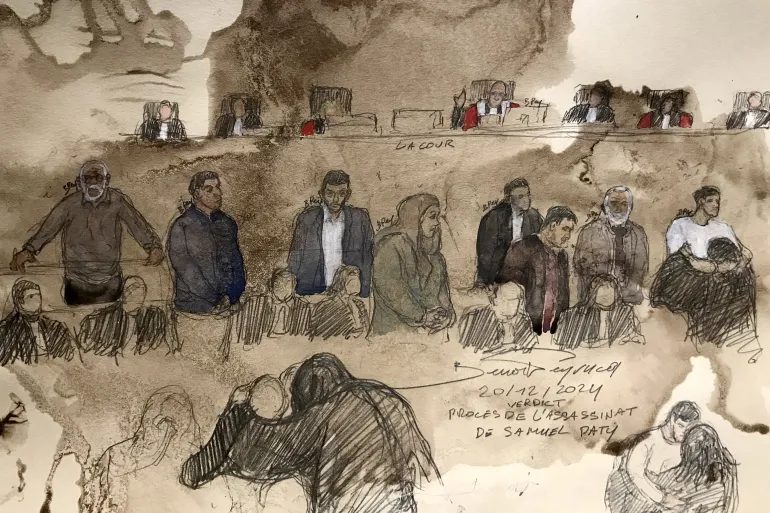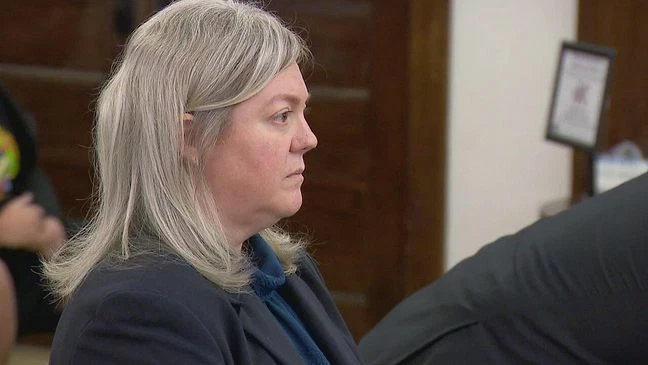Eight sentenced in France in connection with murder of teacher Samuel Paty

In a significant legal development, eight individuals have been sentenced in France for their involvement in the tragic murder of Samuel Paty, a history and geography teacher who was beheaded by an extremist in October 2020. The case, which shocked France and the world, was a pivotal moment in the ongoing fight against terrorism, radicalization, and the protection of free speech. The sentences, handed down by a French court, bring some closure to a horrific incident that highlighted the dangers faced by educators and the importance of defending democratic values in the face of extremism.
The Tragic Event:
Samuel Paty was killed outside of the school where he taught in Conflans-Sainte-Honorine, a suburb of Paris. The teacher had shown a controversial caricature of the Prophet Muhammad to his students as part of a lesson on free speech and the limits of expression. This act, which was intended to foster a discussion about the values of the French Republic, sparked outrage among certain segments of the Muslim community. It eventually led to an orchestrated campaign against Paty, culminating in the horrific murder.
The assailant, an 18-year-old Chechen refugee named Abdullakh Anzorov, attacked Paty in broad daylight, beheading him with a knife before being shot dead by police. In the aftermath, it was revealed that the murder had been planned, with multiple individuals playing various roles in helping the perpetrator identify and locate the teacher. This included disseminating his identity on social media and encouraging others to take action against him.
The Sentences:
The court’s recent ruling saw eight people sentenced for their roles in the events leading up to Paty’s murder. These individuals, who were found guilty of various charges, including complicity, harassment, and assisting in the identification of the victim, received varying sentences. While some were given prison terms, others were sentenced to house arrest or probation.
Among those convicted were individuals who had spread online messages targeting Paty, including a parent of one of Paty’s students who initially began the online campaign against the teacher. This parent had criticized Paty’s teaching methods and raised public calls for action against him. Several other individuals had facilitated the exchange of information that ultimately allowed Anzorov to locate Paty and carry out his attack.
The trial highlighted the dangers of social media and the ease with which extremist ideas can be spread, especially when individuals exploit platforms to incite violence or radicalize others. It also underscored the critical role of education in a democracy and the need for society to stand up for the principles of free speech and tolerance in the face of radical forces.
The Impact of Paty’s Murder:
Samuel Paty’s death sent shockwaves through France and around the world. It was not just an attack on a teacher but an attack on the values of the French Republic, including freedom of expression, secularism, and the right to educate. Paty’s murder prompted an outpouring of support for the teacher and for the principles he stood for, with mass rallies across France and expressions of solidarity from people worldwide.
The French government responded swiftly, reaffirming its commitment to defending free speech and combating radicalism. President Emmanuel Macron, in particular, took a firm stance in the aftermath of the killing, emphasizing the importance of secularism and the need to protect educators who are at the frontlines of promoting democratic values.
In the wake of the attack, the French authorities have increased efforts to combat online radicalization, strengthen the security of public sector employees, and ensure that acts of extremism do not go unpunished. These measures reflect the country’s determination to prevent similar attacks in the future.
Legal and Societal Reactions:
The sentencing of those involved in Paty’s murder has been met with mixed reactions. While many in France have welcomed the verdict as a necessary step in the fight against extremism, others have expressed concern over the broader societal implications. Some fear that the trial may have been used as a tool to further stoke divisions between communities, particularly between the Muslim and non-Muslim populations in France.
At the same time, there is widespread recognition of the need to address the underlying issues of radicalization, social marginalization, and the challenges facing young people who may be susceptible to extremist ideologies. France’s ongoing struggle with these issues remains a central part of the national discourse, and Paty’s death has only intensified calls for comprehensive reforms to address the root causes of terrorism and violence.
The conviction of eight individuals in connection with the murder of Samuel Paty marks a significant moment in France’s battle against extremism and terrorism. While the sentences bring some closure to a tragedy that has left a lasting impact on the country, they also serve as a reminder of the importance of standing up for the fundamental principles of free expression and tolerance. As France continues to grapple with the challenges posed by radicalization, the legacy of Samuel Paty will live on as a symbol of courage, dedication, and the ongoing fight for the values that define democratic societies.






